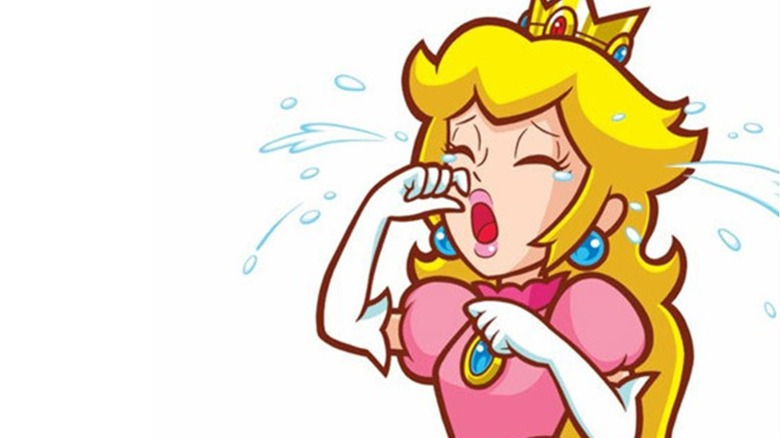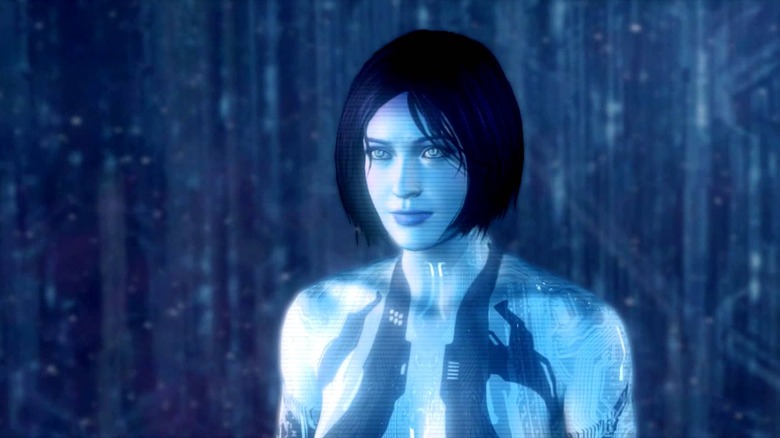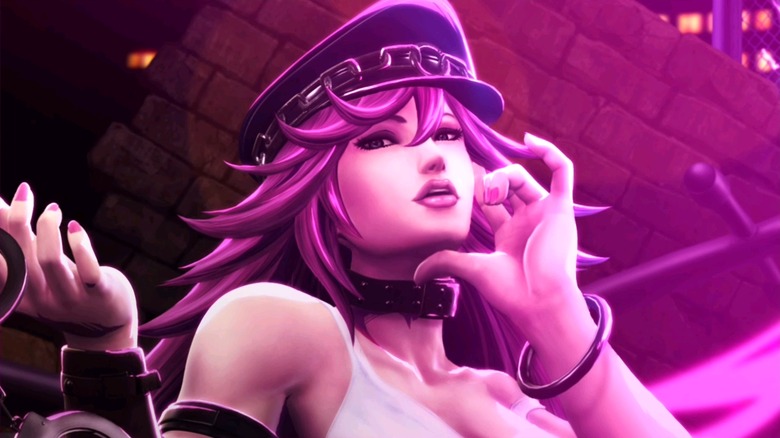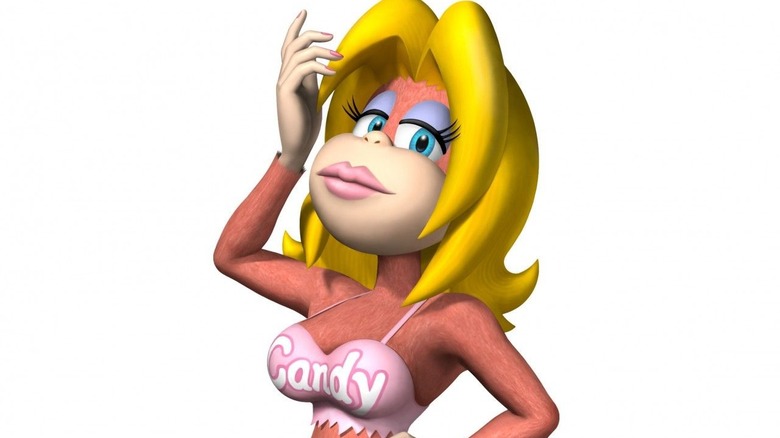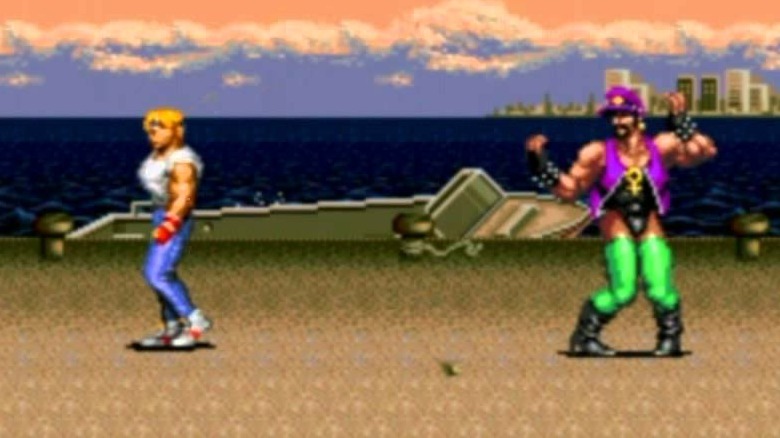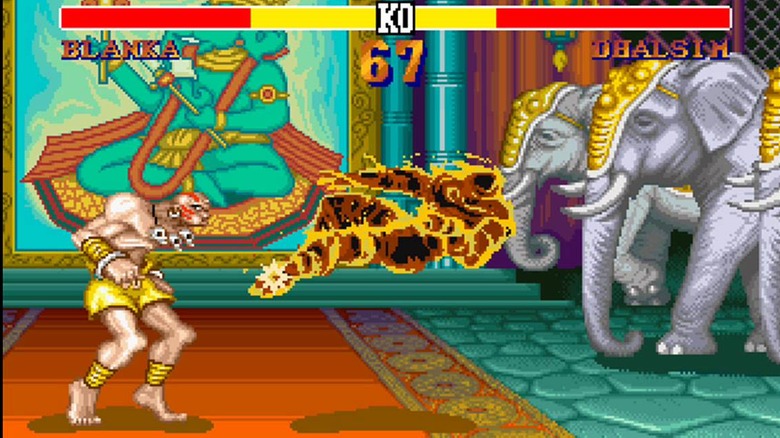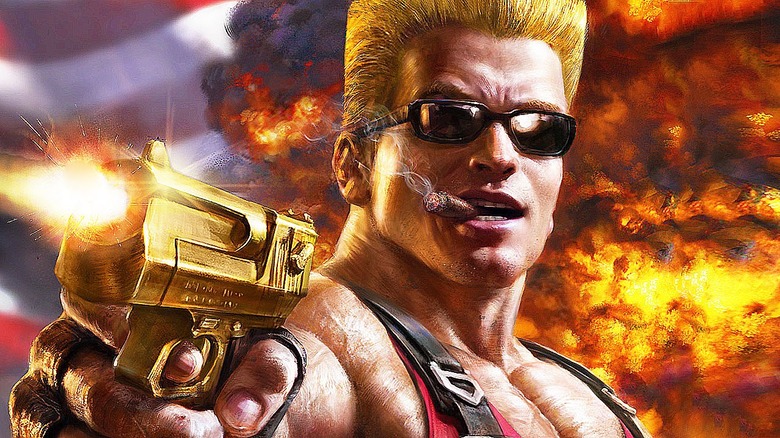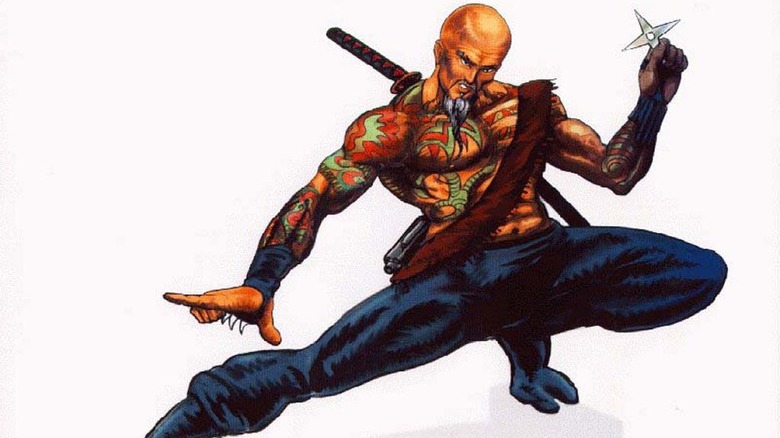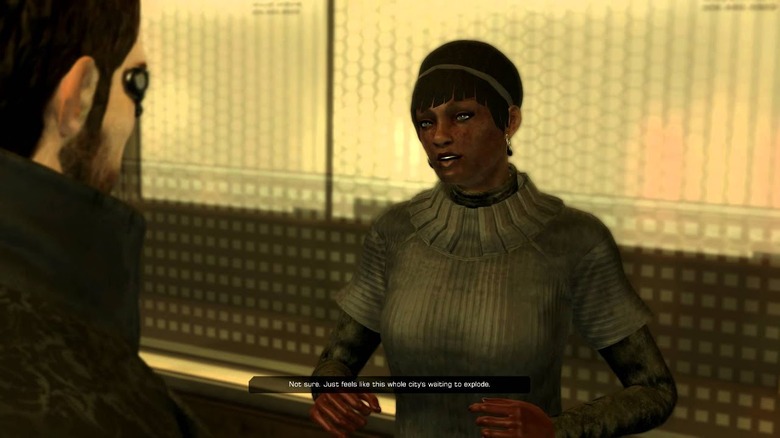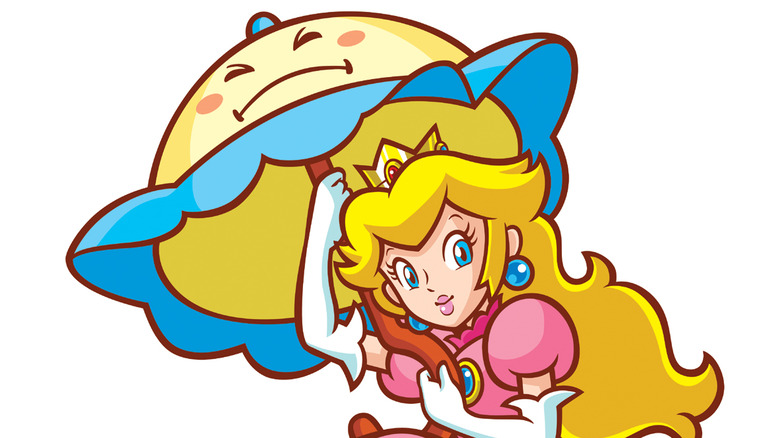Video Game Characters Who Would Be Totally Inappropriate Today
Despite what an unholy legion of faceless trolls would have you believe, the world of video games is indeed a different place from what it was even ten years ago, to say nothing of what it was 20 or even 30 years ago. It's not a perfect place, of course, but it is better and more inclusive and open than it was. The folks creating the games have become more diverse, and more mindful that a vast and diverse audience is playing. The days of Custer's Revenge are long gone, and the industry is very much better for it.
Even still, you can't move forward without looking back, and questionable design decisions haven't just gone away overnight. So it's worth it to take a look at a few character decisions that absolutely, positively deserve to stay in the past, where they belong.
Cortana, Halo
Cortana is as much a staple of the Halo universe as the Master Chief, and undoubtedly the one with the most fascinating and even heartbreaking story beats. Seriously, if you weren't a weepy mess at the line "Welcome home, John" in Halo 4, please see a therapist. As a character, Cortana is great.
Of course, there's one major elephant in the room with regards to everybody's favorite AI, and almost 20 years in, there has yet to be a satisfactory excuse to explain it away: Bungie made a companion character who's basically a naked woman. More than that, a naked woman who seems to be designed to be deliberately sexier each and every game. The settled upon explanation remains that Cortana's nudity is to make her seem vulnerable to put others off their game — just like the Windows version *rimshot* — but virtually no one buys that. Thankfully, Jen Taylor's voice performance has always made what could've easily been an embarrassing portrayal into so much more, and there's hope for the universe yet considering that the first thing 343 has Cortana do once she goes rogue in Halo 5 is put on some clothes.
Poison, Final Fight
Poison is a bit of a strange situation. See, she and her other female enemy counterpart Roxy were originally hard-as-nails girl gang members in the Japanese version of Final Fight. But fearing that having roided-out mayor Mike Haggar piledriving a woman into the pavement ad nauseum might not go down so well in the West, the developers at Capcom had the girls changed into pre-op transgender men in the American version, but while still wearing the same outfit, hoping this would silence the controversy (the SNES port would go the full mile and make Poison and Roxy men named Sid and Billy). Instead, it backed Capcom into a corner they've been hesitant to definitively get out of.
While fans have been more than happy to lean into Poison as a trans woman, Capcom themselves have essentially instituted a Don't Ask, Don't Tell situation where Poison's gender is "a mystery" for fans to debate. Despite the fact that it's never been a better time for Capcom to let one of their characters simply be trans, the whole mess that got Poison to where she is today would never be seen today.
Candy Kong, Donkey Kong 64
For a time, it really did seem like there was no better motivator for the vast majority of video game heroes than the promise of implied sex at the end, which is bad enough when all your female characters in a game are just tied up damsels waiting to be rescued. When the implied sex isn't even human, it's so much worse.
Enter Candy Kong, who starts out as the guardian of your precious save points in Donkey Kong Country, but evolves into a full-on monkey sexpot by the time Donkey Kong 64 rolls around just a few short years later, to the point of making not-even-thinly veiled prostitution innuendo and boob jokes. May we remind you, despite coming from the same people who brought you a big-breasted sunflower, DK64 was an E-rated game on a Nintendo system. While she hasn't been a major part of any Donkey Kong game since those days, she does pop up in Smash Bros. as a trophy, and an immortal reminder of what developers should not do, ever.
Ash, Streets of Rage 3
Every once in a while, censorship really is for the best. Streets of Rage 3 doesn't have a whole lot going for it to begin with — everything from the hit detection to Yuzo Koshiro's uncharacteristically unlistenable score just feels wrong and off — but the ultimate dealbreaker thankfully never made it out of Japan.
While the game underwent a slew of changes from its Japanese counterpart to begin with, one no brainer nobody argues about is the removal of Ash, the first stage's miniboss, who might be the most astonishingly offensive gay stereotype to ever grace a video game. We're talking a full-on leather daddy outfit with overexaggerated flailing run animations and a hyper-effeminate slap main attack. Ash was even a third unlockable character, alongside Roo and Shiva.
The West may have missed out on a lot of stuff when the game got released outside Japan. Nobody misses this. But, hey, thank goodness modern beat-em-ups have gotten past the need to resort to dated, gross portrayals of LGBT folks to look edgy — oh, wait.
Dhalsim, Street Fighter
Fighting game characters have generally worked mostly like the WWE in terms of design, in that broad stereotypes are considered cruise control for character development. Having a Japanese martial artist isn't enough, they have to be the best martial artist who ever lived, with all-encompassing ideas of honor and victory. Americans tend to be blonde haired, blue-eyed, arrogant pretty boys or buxom airheads. And just like the WWE by and large, the stereotypes are harmless.
Still, even within that framework, there's a thin tightrope to walk between exaggerated stereotype and active offense, and Dhalsim is awfully wobbly and leaning towards the less-charitable end. He's an almost skeletal Indian fighter whose mastery over the mystical art of yoga gives him super-powered stretchy limbs and fire breath. Now, granted, that's more ridiculous now, considering you can get free yoga lessons at your local mall, but Dhalsim is still a collection of ethnic exaggerations that absolutely wouldn't fly if he were brand new to the 21st century. Honestly, as much as Capcom tries to make him a bit more dignified, he only just barely cuts it as acceptable after almost 30 years.
Duke Nukem
The whole alpha-male war machine era of action stars in film is long gone, with the closest modern analogue being Vin Diesel's gang of lovable softy gearheads in the Fast & the Furious series. So, naturally, a walking, sexist douchebag parody of that era like Duke Nukem is about as relevant to the 21st century as landline phones.
And yet, it's not like it can't be made relevant. Far Cry: Blood Dragon is a grand example of how to pay homage to that era with a willingness to make fun of itself. Bulletstorm is an even better example of how to update it, with a main character who's basically Sterling Archer in Marcus Fenix's body. But all of Duke's missions are about rescuing some nebulous number of "babes." The character just gets more and more embarrassing, which even in a best-case-scenario world (where Duke Nukem Forever didn't happen) would've been proven by injecting Duke's dated shtick into Bulletstorm.
Lo Wang, Shadow Warrior
We'll say this for old Duke, though: he's just antiquated. He's at least not stultifyingly racist like his Asian counterpart in the Shadow Warrior series, Lo Wang. The pun in the guy's name is just the tip of the iceberg, though. We're talking a whole game of yellowface voice acting that makes Mickey Rooney in Breakfast at Tiffany's look like the cast of Crazy Rich Asians, and that's before you get to the awful and inescapable penis jokes in game and the endless stream of sexualized come-ons towards every woman in game under 30. Ten minutes in, and Duke Nukem starts to sound like a gentleman.
The 2013 remake is, thankfully, a vast improvement. Lo Wang's still voiced by a white guy, which is a problem, and the game's still juvenile, but in that fun way where the guy just clearly enjoys his job lopping off the heads of demons and yakuza alike. And at very least, Lo Wang gets saddled early on with a sidekick named Hoji who keeps him honest. But the idea of someone creating a brand new character like Lo Wang in 2019 is nauseating, and it has nothing to do with bad sushi.
Letitia, Deus Ex: Human Revolution
Deus Ex did a pretty decent job angering people of color when Mankind Divided was announced by invoking apartheid in describing the void between human residents and cyborgs. While the backlash was warranted, that was nothing compared to Human Revolution including a black character that still makes players Wikipedia the game just to make sure what year it was made. It was 2011, by the way, and yes, that just makes it worse.
Letitia is one of the NPCs in Detroit — the city, not the game, even David Cage isn't THAT stupid — and is supposed to be one of those old-school "word on the street"-type characters. Her script definitely reads that way for the majority of the time. But coupled with that hideous, over-the-top voice acting, Letitia's an utter cartoon of a black character, one of the most sour, ugly notes in a game that by and large does a great job with portraying the problems of inequality among a diverse populace.
Princess Peach, Super Princess Peach
The whole "save the princess" cliche is dying a long-overdue death as far as video game plots are concerned, so it's always disappointing that Mario games keep going back to that well. Still, it's hard to say which is worse: Mario having to go rescue the poor woman every few years, or Peach having to go rescue Mario, and her only weapons are women's fickle emotions.
Super Princess Peach is the game that gave us the latter, one of those rare but always shocking Nintendo moments where you're reminded why their games maybe try to stay apolitical. In it, Peach runs, jumps, and climbs, but can change her emotional state at will, which, because she's on Vibe Island, actually affects the physical properties of the world. Naturally, the game never says Peach is PMSing or anything like that, but that's the look, and it's not a good one, nor is it one we expect will ever happen again. Thankfully, Nintendo agreed when it came to Mario Odyssey, and giving Peach some measure of independence without plumber boy or his dragon (turtle? dinosaur?) friend.

